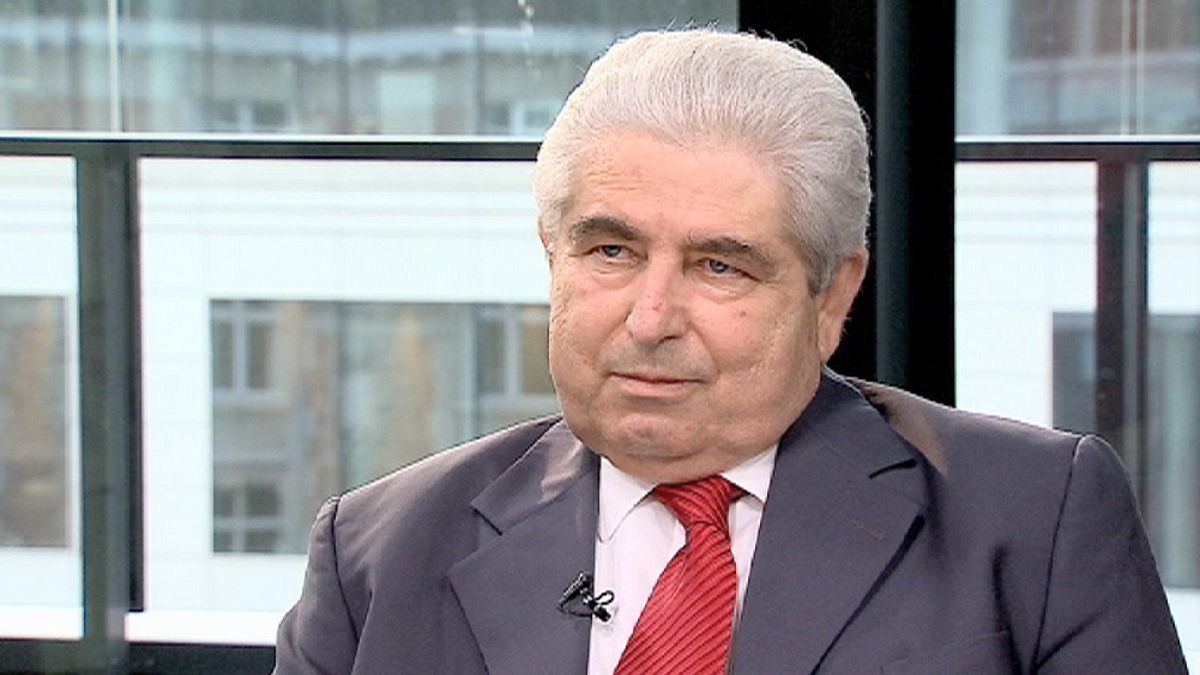The European Union is currently undergoing one of the most turbulent economic periods in its short history, with political, ideological and financial divisions threatening to bring its fragile edifice tumbling down.
Andrei Beketov, Euronews:
Euronews welcomes to its studio the President of Cyprus, whose country has just taken over the presidency of the Council of the European Union.
What is the most important thing that you want to achieve in the next six months?
Demetris Christofias:
Together with the European Commission and the European Parliament (we are all part and parcel of the European Union) we need to put forward a programme to tackle economic problems. The main priority will be negotiations on the multi-annual financial framework, which will be conducted with the 27 EU members, in particular the Eurozone partners, and all the institutions until December.
We can not resolve the economic crisis exclusively through the policy of budgetary austerity. We can not go forward without development, without creation of jobs, without a more gradual or fairer distribution of wealth produced in the European Union. This is our general philosophy.
Euronews:
When you were talking about too much austerity, I wonder whether it was the Communist in you talking. Your ideology isn’t shared by many European politicians. How will your Communist views affect the Cypriot presidency and maybe the policy of the whole of the European Union?
Demetris Christofias:
Before assuming the post of the president of the Republic of Cyprus, I made it clear that I will not try to implement my own Communist ideology. I will use the capitalist system, but in a fair way. Maybe capitalism is inhumane but at the same time we can have fairer distribution of wealth without introducing a communist regime. I am a member of a political party of working people, it is a progressive party. Now is the time to solve the daily problems of people and nations. We will see how we handle the ideology issue later.
Euronews:
Also on your background, if I may. You studied in Russia, you speak Russian. Does it mean that Brussels will perhaps pay more attention to relations with Russia while you are EU president?
Demetris Christofias:
In my view, the European Union must have relations of friendship and cooperation with Russia which is also part of Europe, we have to acknowledge that. Therefore, if and when needed, we will play a significant role.
Euronews:
Cyprus is expected to lead other countries out of the crisis. But Cyprus is seeking financial help for itself. How will you cope with the two apparently contradictory tasks?
Demetris Christofias:
I don’t think these tasks are contradictory and conflicting. The fact that Cyprus needs external aid to capitalise some banks that have been exposed to Greek bonds doesn’t mean that we must not work for the benefit of other countries that need assistance. I think in Cyprus we dont have big problems with budgetary discipline. Our biggest problem – our banks’ exposure – will be solved with European help.
Euronews:
For most of the European countries, Cyprus is a remote island in the Mediterranean. Could that geographical location be an advantage now?
Demetris Christofias:
Because of its location at the southern border of the European Union, Cyprus can play a very important role as the bridge of a common understanding, friendship and cooperation of the EU with the countries of the region, the Middle East and North Africa. We have very good relations with countries that went through the Arab spring.
Euronews:
How is the EU going to deal with Turkey’s refusal to cooperate with it on many issues during Cyprus’ presidency?
Demetris Christofias:
I think it is a shame that the Turkish government has sent different messages in the past, and only now decides to get tough. My message to Turkey is that it should respect the Republic of Cyprus as an equal member of the European Union.
Euronews:
What other benefits do you see from your country’s presidency in the EU for the issue of reunification?
Demetris Christofias:
The fact that one part of Cyprus is occupied by the military forces of a neighbouring country, which aspires to be a member of the European Union is in itself contradictory. We do not have the will or the force to resolve our problems with Turkey through military means. We have to find peaceful means to develop dialogue. I have suggested it several times to Mr Erdogan and Mr Gul, but unfortunately they don’t recognise me as the president of the Republic of Cyprus.
Euronews:
How will Cyprus be different from its predecessors in the EU presidency – Denmark, Poland and others?
Demetris Christofias:
One should not expect a revolution from Cyprus inside the European Union. However, because of the philosophy which I expressed earlier, I am happy to say that the Council is starting to be a little less liberal. It has moved towards the policy of solidarity among the people and states of the Union.
Euronews:
Demetris Christofias, president of Cyprus and Council of the EU, thank you very much for the interview.
Demetris Christofias:
Thank you for inviting me.
Spasibo bolshoe
